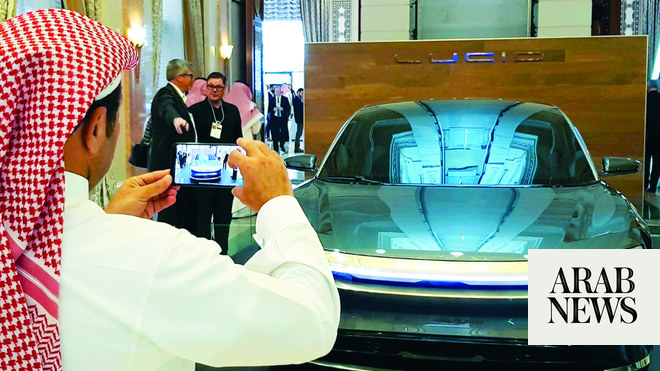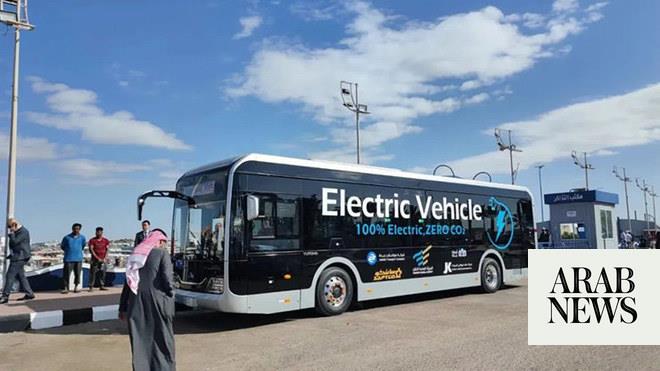
Saudi investments in EV production are expected to reach $50 billion over the next decade
At least 30 percent of the vehicles on the road in Riyadh are expected to be electric by 2030
DUBAI: Although the electric-vehicle market in the Middle East is still in its infancy, the global rollout of new EV models is accelerating their adoption in the region as governments and consumers embrace the transition away from the internal combustion engine.
A new study by Goldman Sachs predicts that EVs will make up about half of new car sales worldwide by 2035. “While the EV sector is beset by some major crosscurrents . . . our strategists expect technology innovation to supersede these forces in the coming years,” says the report by Goldman Sachs Research.
Meanwhile, as increased competition, government incentives and falling prices of battery-related products and vehicle components make EVs more affordable, the likelihood grows of at least some models becoming as cheap as vehicles with ICE engines before the year ends.
While Elon Musk’s Tesla brand currently leads the Middle East EV market, among the electric models that can be found in the region are the MG ZS EV, Renault Zoe E-Tech and the Volvo XC40 Recharge Pure Electric, alongside the recently launched Swedish brand, Polestar.
The increasing focus on EV adoption, including in the Arab Gulf states, is largely driven by national commitments to accelerate the transition from fossil fuels to renewable energy sources to achieve net-zero targets within the coming decades.
This transition will not happen overnight, however, as the Gulf countries still need to increase greatly the number of charging stations available for these new vehicles — to give EVs sufficient range and to incentivise consumers to buy electric.
“The market for electric vehicles is expected to grow across the region, driven largely by the continued government-led reforms, specifically in building infrastructure to allow consumers to travel long distances,” Tom Lee, managing director of MG Motor Middle East, told Arab News.
According to market research firm Mordor Intelligence, the Middle East and African EV market was valued at $40.25 million in 2021, and is expected to reach $93.10 million by 2027, registering a compound annual growth rate of more than 15 percent during the forecast period.
The numbers are remarkable considering that the global EV market suffered a major setback during the COVID-19 pandemic, which saw the closure of several manufacturing units and the start of a global semiconductor chip shortage, which continues to impact industries to this day.
Sales of zero-emissions vehicles have since bounced back worldwide, doubling in 2021 from the previous year, marking a new record at just under 7 million cars — equivalent to 10 percent of all car sales, according to the Global EV Outlook, published by the Electric Vehicles Initiative.
The same was the case in 2022, when global sales of EVs steadily increased, with 2 million cars sold in just the first quarter. This year, EV market revenues are projected to reach $322.50 million.
“Education of consumers (in the region) has rapidly increased, driven by GCC countries’ renewable energy plans and the drop in the price of electric vehicles,” Lee told Arab News.
This awareness is likely to grow when the UAE hosts the UN Climate Change Conference, COP28, in November, coinciding with its “Year of Sustainability.” Lee says the UAE’s manufacturing plans are also a lucrative investment opportunity.
Currently, eco-friendly or hybrid vehicles make up some 50 percent of the Dubai Roads and Transport Authority’s taxi fleet. A five-year plan has been launched to have only hybrid, electric or hydrogen-powered taxis on the emirate’s roads by 2027.
Launched in 2016, Ekar, the region’s first mobility company and self-drive super app, has jumped on the EV bandwagon, adding 10 Teslas to its fleet available for rent in Dubai and five additional Teslas available in Abu Dhabi’s Masdar City.
“EVs are exceptionally good cars for car sharing,” Vilhelm Hedberg, co-founder and CEO of Ekar, told Arab News.
“There are fewer moving parts in an EV compared to an internal combustion engine car, which has a ton of different opportunities for failure, maintenance and issues to arise, making the vehicle off-road time much lower in EVs.”
At present, there are about 325 charging stations for EVs across the UAE, catering for less than 1 percent of all vehicles registered in the country. However, Hedberg believes the number of EVs on the road will rise over the next couple of years.
“There’s a global readiness equation that’s calculated for EVs and the UAE finds itself ranked eighth in the world,” he said. Norway, China, Germany, Singapore and the UK take the top five rankings for EV market share.
“(Because of) the very fact that the UAE has the infrastructure already beginning to be laid out, it is headed in the right direction.”
With total Saudi investments in EV production expected to reach $50 billion over the next decade, the hope is that least 30 percent of the vehicles on the road in Riyadh will be electric in the next seven years.
“The Saudi public has a strong affinity for their cars. There’s so much enthusiasm for classic cars and for iconic car models,” a spokesperson for Ceer, Saudi Arabia’s first homegrown EV brand, told Arab News.
According to the spokesperson, Saudis “also have a strong affinity for technology” and, therefore, will look to adopt new concepts.
“You can find battery electric vehicles on the streets of Dammam, Jeddah and Riyadh even though many brands don’t sell BEVs officially in Saudi Arabia today,” the spokesperson said, referring to fully electric vehicles with rechargeable batteries and no petrol engine.
Claiming that Ceer’s research on consumer insights revealed a strong interest in the company’s portfolio of vehicles, the spokesperson said: “The interest is both due to the vehicles’ iconic design and infotainment features, but also due to a host of other factors, including value for money, total cost of ownership, and increasing awareness of topics related to sustainability.”
In 2020, there were more than 15 million registered vehicles in the Kingdom. Four-fifths of these were cars or light vehicles. According to the Saudi Energy Efficiency Center, the transport sector consumed about 21 percent of the Kingdom’s total energy that year.
Saudi Arabia plugs into the future
With 61 percent of shares, Saudi Arabia is the majority owner of Lucid Group through its Public Investment Fund, or PIF. Set to be built in King Abdullah Economic City on the Red Sea coast, Lucid’s first overseas manufacturing plant will initially reassemble Lucid Air vehicle “kits” manufactured in Arizona, the US.
Eventually, the plant will build complete vehicles with a planned peak capacity of 150,000 vehicles a year. Saudi Arabia’s first homegrown EV brand, Ceer Motors, was launched late last year by Crown Prince Mohammed bin Salman.
Backed also by PIF, Ceer will be the first automotive brand to produce EVs in Saudi Arabia, with plans to sell a range of vehicles for consumers both in the country and the Middle East and North Africa region. The first units are expected to become available in 2025.
With a production target of 170,000 cars a year, Ceer is expected to create up to 30,000 direct and indirect jobs in the region, and directly contribute $8 billion to Saudi Arabia’s GDP by 2034.
The Kingdom’s giga-projects, such as Qiddiya, Roshn and NEOM, have plans to deploy fleets of EVs, produced in time by the Lucid and Ceer factories in King Abdullah Economic City.
To support the transition from traditional petrol engines to electric mobility, Mohamed Shaheen, KSA and Yemen cluster president at Schneider Electric, believes a strong energy management infrastructure is essential.
The EVlink smart charger launched in the region last year is just one of many next-generation products that will help build a more sustainable energy matrix for the future, he told Arab News.
According to Shaheen, although the cost of an eco-friendly vehicle is markedly lower today than before, simply increasing the number of EVs on the road will not be enough to reduce emissions.
“A smart and sustainable charging experience that can monitor, manage and eventually limit the use of EV charging devices with the aim of optimizing energy consumption can help EVs become even cleaner,” he said.
According to Boston-based Energy Sage, charging an EV is about 3.5 times cheaper per mile than the cost of fueling up a petrol car.
“It is imperative to understand that — in the long term — EV charging is cost-effective,” particularly when steps are taken to develop more sustainable production processes, Shaheen said.
However, despite the growing public readiness for EV adoption in the region, the deciding factor ultimately would be consumers’ willingness to swap their petrol engine vehicle for an electric option.
Surveys show that people are looking for “the reliability and comfort they are used to in traditional engines,” said Lee of MG Motors.
“With the falling prices of EVs and the increase in petrol prices, there has been a fundamental shift in the market.”
Pointing to the fluctuations in fuel prices over 2022 as a factor that has influenced consumer decision-making, he said that by 2026 almost 45,000 EVs are expected to be sold in the region.
Fuel bills apart, EVs generally have a strong resale value, which is why more and more people are looking at them as a sound investment, according to Ekar’s Hedberg.
He drew attention to a survey commissioned by Audi Abu Dhabi, which found a change of sentiment among consumers, with 52 percent of UAE residents considering buying an EV.
“But my view of the world is that people shouldn’t own cars,” Hedberg said. “They should treat cars like they treat clothing and interchange them for the various occasions that they need them for,” he said.
Studies show that every car shared removes 17 private cars from the road, he said.
In recent years, the car-sharing trend has caught on in European cities, resonating with people who want to lead a more sustainable lifestyle.
While the same cannot be said for the Middle East region yet, the consensus view of automotive-industry executives is that EVs and new energy vehicles are the way forward.












